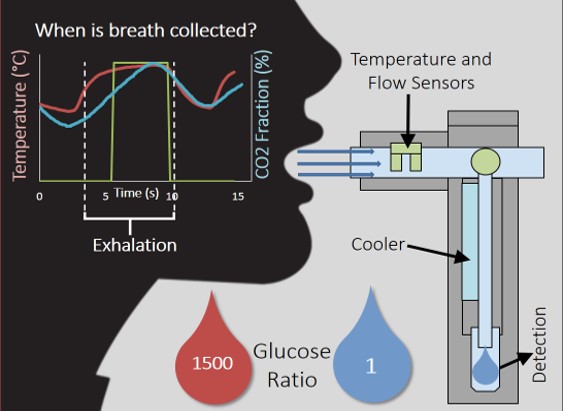Linnes received a patent for a device that will improve glucose monitoring
“This work carries on the legacy of Ann Rundell and Leslie Geddes,” said Linnes. Geddes was the founding director of biomedical engineering at Purdue University. Rundell was a leader and a role model, playing a critical part in developing the undergraduate BME curriculum.
“This research is based off calculations by Dr. Geddes and a project he was working on with Dr. Rundell using dry ice for cooling. When I started at Purdue, Dr. Rundell reached out, needing someone who does research using instrumentation,” said Linnes. “It is great to see their work continue in this patent.”
Non-invasive methods for the detection and monitoring of diseases like diabetes are key in ensuring patient compliance and access. Small molecule analytes, such as glucose, provide valuable insight into a patient’s health. While self-monitoring of blood glucose is critical to properly controlling diabetes, two-thirds of patients fail to monitor their glucose levels due to the painful and invasive nature of current blood glucose detection methods.
As an alternative to blood sample collection, exhaled breath condensate (EBC) has emerged as a promising noninvasive sample from which to monitor glucose levels. However, this dilute sample matrix requires sensors capable of detecting glucose with high resolution at nanomolar and micromolar concentrations. Recent developments in EBC collection methods and highly sensitive glucose biosensors provide a path toward enabling robust and sensitive glucose detection in EBC.
Linnes and her team have developed an EBC glucose detection system that will enable clinically robust and accurate EBC glucose measurements for improved glycemic control.

Linnes is an assistant professor of Biomedical Engineering Her research interests include point-of-care diagnostics for global health, pathogen detection and evaluation of therapeutic efficacy, miniaturization of molecular bioassays, rapid prototyping and low-cost health technologies and microfluidics and paper-based diagnostics. To learn more about her research visit https://engineering.purdue.edu/LinnesLab.
Congratulations to all Purdue University researchers across all campuses and academic disciplines, who received a patent on their intellectual property from the U.S. Patent and Trademark Office in July.
Most of these innovations are available to license and bring to market. Visit the Purdue Innovates Office of Technology Commercialization’s website to learn more about these and other available innovations.
Source: Purdue Research Foundation
Read more on Non-invasive glucose detection in exhaled breath condensate.

